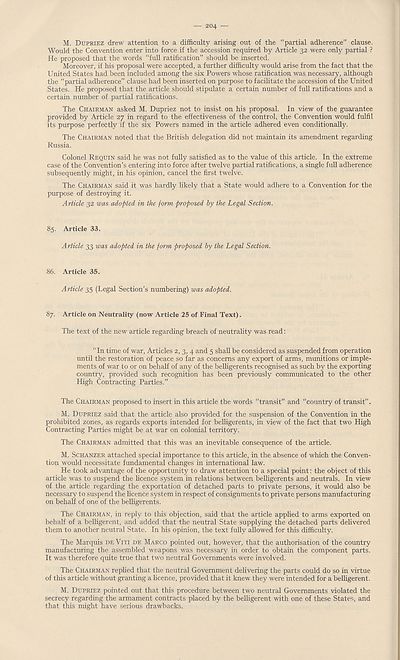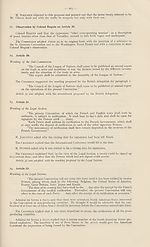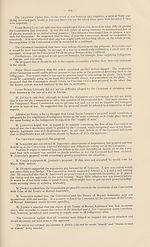Armament > Conference for the control of the international trade in arms, munitions and implements of war
(206)
Download files
Complete book:
Individual page:
Thumbnail gallery: Grid view | List view

— 204
M. Dupriez drew attention to a difficulty arising out of the “partial adherence” clause.
Would the Convention enter into force if the accession required by Article 32 were only partial ?
He proposed that the words “full ratification” should be inserted.
Moreover, if his proposal were accepted, a further difficulty would arise from the fact that the
United States had been included among the six Powers whose ratification was necessary, although
the “partial adherence” clause had been inserted on purpose to facilitate the accession of the United
States. He proposed that the article should stipulate a certain number of full ratifications and a
certain number of partial ratifications.
The Chairman asked M. Dupriez not to insist on his proposal. In view of the guarantee
provided by Article 27 in regard to the effectiveness of the control, the Convention would fulfil
its purpose perfectly if the six Powers named in the article adhered even conditionally.
The Chairman noted that the British delegation did not maintain its amendment regarding
Russia.
Colonel Requin said he was not fully satisfied as to the value of this article. In the extreme
case of the Convention’s entering into force after twelve partial ratifications, a single full adherence
subsequently might, in his opinion, cancel the first twelve.
The Chairman said it was hardly likely that a State would adhere to a Convention for the
purpose of destroying it.
Article 32 was adopted in the form proposed by the Legal Section.
85. Article 33.
Article 33 was adopted in the form proposed by the Legal Section.
86. Article 35.
Article 35 (Legal Section’s numbering) was adopted.
87. Article on Neutrality (now Article 25 of Final Text).
The text of the new article regarding breach of neutrality was read:
“In time of war, Articles 2, 3, 4 and 5 shall be considered as suspended from operation
until the restoration of peace so far as concerns any export of arms, munitions or imple¬
ments of war to or on behalf of any of the belligerents recognised as such by the exporting
country, provided such recognition has been previously communicated to the other
High Contracting Parties.”
The Chairman proposed to insert in this article the words “transit” and “country of transit”.
M. Dupriez said that the article also provided for the suspension of the Convention in the
prohibited zones, as regards exports intended for belligerents, in view of the fact that two High
Contracting Parties might be at war on colonial territory.
The Chairman admitted that this was an inevitable consequence of the article.
M. Schanzer attached special importance to this article, in the absence of which the Conven¬
tion would necessitate fundamental changes in international law.
He took advantage of the opportunity to draw attention to a special point: the object of this
article was to suspend the licence system in relations between belligerents and neutrals. In view
of the article regarding the exportation of detached parts to private persons, it would also be
necessary to suspend the licence system in respect of consignments to private persons manufacturing
on behalf of one of the belligerents.
The Chairman, in reply to this objection, said that the article applied to arms exported on
behalf of a belligerent, and added that the neutral State supplying the detached parts delivered
them to another neutral State. In his opinion, the text fully allowed for this difficulty.
The Marquis de Vm de Marco pointed out, however, that the authorisation of the country
manufacturing the assembled weapons was necessary in order to obtain the component parts.
It was therefore quite true that two neutral Governments were involved.
The Chairman replied that the neutral Government delivering the parts could do so in virtue
of this article without granting a licence, provided that it knew they were intended for a belligerent.
M. Dupriez pointed out that this procedure between two neutral Governments violated the
secrecy regarding the armament contracts placed by the belligerent with one of these States, and
that this might have serious drawbacks.
M. Dupriez drew attention to a difficulty arising out of the “partial adherence” clause.
Would the Convention enter into force if the accession required by Article 32 were only partial ?
He proposed that the words “full ratification” should be inserted.
Moreover, if his proposal were accepted, a further difficulty would arise from the fact that the
United States had been included among the six Powers whose ratification was necessary, although
the “partial adherence” clause had been inserted on purpose to facilitate the accession of the United
States. He proposed that the article should stipulate a certain number of full ratifications and a
certain number of partial ratifications.
The Chairman asked M. Dupriez not to insist on his proposal. In view of the guarantee
provided by Article 27 in regard to the effectiveness of the control, the Convention would fulfil
its purpose perfectly if the six Powers named in the article adhered even conditionally.
The Chairman noted that the British delegation did not maintain its amendment regarding
Russia.
Colonel Requin said he was not fully satisfied as to the value of this article. In the extreme
case of the Convention’s entering into force after twelve partial ratifications, a single full adherence
subsequently might, in his opinion, cancel the first twelve.
The Chairman said it was hardly likely that a State would adhere to a Convention for the
purpose of destroying it.
Article 32 was adopted in the form proposed by the Legal Section.
85. Article 33.
Article 33 was adopted in the form proposed by the Legal Section.
86. Article 35.
Article 35 (Legal Section’s numbering) was adopted.
87. Article on Neutrality (now Article 25 of Final Text).
The text of the new article regarding breach of neutrality was read:
“In time of war, Articles 2, 3, 4 and 5 shall be considered as suspended from operation
until the restoration of peace so far as concerns any export of arms, munitions or imple¬
ments of war to or on behalf of any of the belligerents recognised as such by the exporting
country, provided such recognition has been previously communicated to the other
High Contracting Parties.”
The Chairman proposed to insert in this article the words “transit” and “country of transit”.
M. Dupriez said that the article also provided for the suspension of the Convention in the
prohibited zones, as regards exports intended for belligerents, in view of the fact that two High
Contracting Parties might be at war on colonial territory.
The Chairman admitted that this was an inevitable consequence of the article.
M. Schanzer attached special importance to this article, in the absence of which the Conven¬
tion would necessitate fundamental changes in international law.
He took advantage of the opportunity to draw attention to a special point: the object of this
article was to suspend the licence system in relations between belligerents and neutrals. In view
of the article regarding the exportation of detached parts to private persons, it would also be
necessary to suspend the licence system in respect of consignments to private persons manufacturing
on behalf of one of the belligerents.
The Chairman, in reply to this objection, said that the article applied to arms exported on
behalf of a belligerent, and added that the neutral State supplying the detached parts delivered
them to another neutral State. In his opinion, the text fully allowed for this difficulty.
The Marquis de Vm de Marco pointed out, however, that the authorisation of the country
manufacturing the assembled weapons was necessary in order to obtain the component parts.
It was therefore quite true that two neutral Governments were involved.
The Chairman replied that the neutral Government delivering the parts could do so in virtue
of this article without granting a licence, provided that it knew they were intended for a belligerent.
M. Dupriez pointed out that this procedure between two neutral Governments violated the
secrecy regarding the armament contracts placed by the belligerent with one of these States, and
that this might have serious drawbacks.
Set display mode to:
![]() Universal Viewer |
Universal Viewer | ![]() Mirador |
Large image | Transcription
Mirador |
Large image | Transcription
Images and transcriptions on this page, including medium image downloads, may be used under the Creative Commons Attribution 4.0 International Licence unless otherwise stated. ![]()
| League of Nations > Armament > Conference for the control of the international trade in arms, munitions and implements of war > (206) |
|---|
| Permanent URL | https://digital.nls.uk/195384441 |
|---|
| Shelfmark | LN.IX |
|---|
| Description | Over 1,200 documents from the non-political organs of the League of Nations that dealt with health, disarmament, economic and financial matters for the duration of the League (1919-1945). Also online are statistical bulletins, essential facts, and an overview of the League by the first Secretary General, Sir Eric Drummond. These items are part of the Official Publications collection at the National Library of Scotland. |
|---|---|
| Additional NLS resources: |
|

